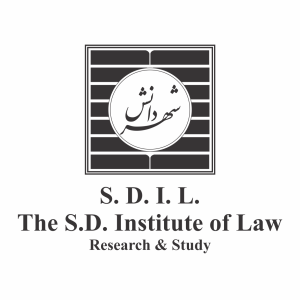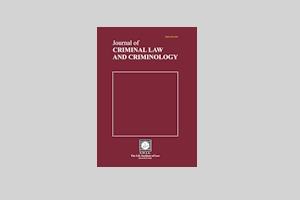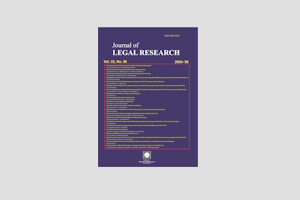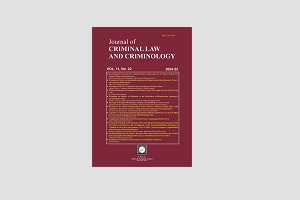Journal of
LEGAL RESEARCH
Number 36
Vol. XVII ● No. 4
Winter 2019
Managing Editor: Vahid Eshtiagh
Editor-in-Chief: Seyyed Ghasem Zamani
CONTENTS
Articles
The Respect for Competition Principle in Public Contracts Dr. Hasan Naemeh State Terrorism: Supposition or Reality?!
Navab Mohammadi Dehcheshmeh
Comparative Study of Predictability Damage Criterion in Iranian and England Laws
Mohsen Jafari Behzadkalaei & Dr. Hamid Abhary
The Legal Requirements and Principles in New Iranian Petroleum Contracts (I.P.C)
Mahdi Haghighian & Dr. Alireza Ebrahimgol
The Iran’s Rights to Orbital Points from the Point of View of International Law
Farnaz Foroutanian Shahrbabaki & Dr. Fatemeh Fathpour
The Status of Resolutions of the UN General Assembly among the Sources of International Law
Jamshid Mazaheri
Legal Effects of African’s Withdrawal from the International Criminal Court
Mohammad Alipour
Penal Populist Reactions on Contrast of Violent Crimes in Iran
Dr. Mohammad Bagher Moghaddasi & Dr. Mohammad Farajiha
Postponement of Sentences and it’s Consequences
Mohammad Javad Alizadeh Goudarzi & Dr. Abolfath Khaleghi
The Role of Biotechnology in Right to Food
Seyedeh Kiana Banikamali
Cyber War Crimes; Islamic State Atrocity Videos and the Laws of War
Author: David P. Fidler & Translator: Amin Zahmatkesh
Articles
The Respect for Competition Principle in Public Contracts
Dr. Hasan Naemeh
Assistant Professor of Bu-Ali Sina University, Hamedan, Iran
Abstract:
The public contract in the Iranian law is kind of formation contract that subject project tender law (was passed in open session on Tuesday 25,01,1383 passed by the house with amendments and Guardian council), according to this law government administrative is obligated to put their work out to contract by tender. In this law a bid is the competitive process to provide the desired quality (according to tender documents), in which the transaction subject the obligation the lowest price offered is appropriate, be delegated. Government official had to performance this process when they need to contract with their contractors.
Completion is keystone of public contract and must be open and transparent. In the competition process government administrators to be able to procure their goods and services in best quality and best price. This article is discussed about the competition and its efficiency to public contract process.
Keywords:
Competition, Monopoly, Tender, Public (Government) Contract, Project Tenders Law.
State Terrorism: Supposition or Reality?!
Navab Mohammadi Dehcheshmeh
Ph.D. Student of International Law, Faculty of Law and Political Sciences, Allameh Tabataba’i University, Tehran, Iran
Abstract:
The term “terrorism” is meaning to threaten and intimidate literally. This term that has French origin was first time used to describing Jacobins reign of terror during French revolutionary in which thousands people were murdered through summary executions and was surrounded entire society by fear.
In recent decades especially after September 11 attacks, terrorism has obtained serious attentions of international community and we have seen discussions, researches and scientific papers about it every day. But meanwhile to “state terrorism” as the key aspect of terrorism paid attention lesser unfortunately and as before has remained lack of a decisive and accepted definition in spite of extensive using of it in legal and political literature.
In this paper I try to define state terrorism in existed legal context, in addition I consider opinions and theories of legal eminent scholars in terrorism context and also expressed criticisms related to it.
Keywords:
State Terrorism, State Support of Terrorism, State Sponsorship of Terrorism, International Terrorism.
Comparative Study of Predictability Damage Criterion in Iranian and England Laws
Mohsen Jafari Behzadkalaei
Faculty Member of Law Department, Payame Noor University, Iran
&
Dr. Hamid Abhary
Professor of Law and Political Science Faculty, University of Mazandaran, Mazandaran, Iran
Abstract:
According to the rules governing to civil liability, the condition of damage predictability plays a crucial role in the damage compensation and it is true about contractual and Forcible liability. About governing criteria upon this condition, there is no clear text whether this criterion is personal or based on custom? The mere status of defendant in personal criterion take into consideration and whether other persons who usually predictable not be attentioned and in custom criterion the mere custom regardless of what’s happening in defendant mind take into account. This study which reviews Iran’s Law and England, analyze Lawyers and jurists Imami decisions and believes besides relevant legal articles, by collecting these two criterion, the criterion in contractual and non-contractual liability introduced an ordinary human who take the place of defendant and cognizant of circumstance considered as an arbitration criterion. Due to the existence of this condition in contractual and non-contractual liability in the England’s Law, a comparative study of this topic is useful.
Keywords:
Contractual Liability, Forcible Liability, Damage Predictability, Personal Criterion, Custom Criterion.
The Legal Requirements and Principles in New Iranian Petroleum Contracts (I.P.C)
Mahdi Haghighian
Ph.D. Student in Oil and Gas Law at Faculty of Law, Shahid Beheshti University, Tehran, Iran
&
Dr. Alireza Ebrahimgol
Professor Assistant at Tehran University, Faculty of Law, College of Farabi, Qom, Iran
Abstract:
The New Iranian petroleum contracts are primarily designated to attract foreign investment in oil fields and to encourage renowned companies to enter Iranian oil sector, enable Iran to compete with contracts drafted by rival countries and boost production level. One of the crucial factors in drafting such contracts is compatibility with national mandatory laws, different rules and laws govern the Iranian oil and gas industry which are comprised from Islamic jurisprudence, constitution and parliament acts. In addition, there are certain obligations which are not enacted by parliaments, nevertheless, because of the national interest or precedent of Iranian contracts, have developed to mandatory rules. Complying with such obligations and rules with the new contract are great significance which is purpose of this research.
Keywords:
Petroleum Contracts, Legal Requirement, Cabinet Act, I.P.C, Constitution Law.
The Iran’s Rights to Orbital Points from the Point of View of International Law
Farnaz Foroutanian Shahrbabaki
M.A in International Law, Faculty of Law and Political Sciences, Allameh Tabataba’i University, Tehran, Iran
&
Dr. Fatemeh Fathpour
Ph.D. in Public International Law, Faculty of Law, Shahid Beheshti University, Tehran, Iran
Abstract:
The geostationary orbit as a valuable and unique orbit exist around the earth and known as a limited natural resource. From past till now many countries have been contributed in many legal disputes about this orbit because of its ownership and legal status. one of the most important of these claims declare from equatorial countries that started their activities from 70`s decade seriously and result in issuance of Bogota declaration but their arguments confront with severe dissent of other countries and international jurists did not protect or accompany with their allegments.
These claims result in jurists and international society notice to find a suitable way to settlement these kinds of disputes and attempting to find a legal system to regulate the use of GSO.
Also our country Iran, confront with some challenges because of it’s orbit points, because of our delay to launch and stabilization of satellites in 26, 34 and 47 points, unfortunately we lost two of these orbit points and there is the risk of losing the other. This article discuss about the problem and the way we can keep our orbit points.
Keywords:
Geostationary Orbit, Bogota Declaration, The Legal Status of Geostationary Orbit, Iran’s Orbit Points.
The Status of Resolutions of the UN General Assembly among the Sources of International Law
Jamshid Mazaheri
Master of International Law, Faculty of Law and Political Sciences, Allameh Tabataba’i University, Tehran, Iran
Abstract:
When discussing the sources of international law, every publicist would think of article 38 of the status of the International court of justice. This does not seem to be contradictory with the reality of international society of states, regarding the high status of the court as a judicial institution composed of prominent lawyers. However, it should be acknowledged that the list is not the only source; in fact, it only addresses the court applicable sources. In this article the relationship between the resolutions of the General Assembly and the sources mentioned in the Status of the court will be analyzed. Regarding Article 38 of the status of the court, we will first consider the status of resolutions among the treaties and then international custom, general principles of law and judicial decisions will be discussed.
Keywords:
General Assembly Resolutions, Sources of International Law, International Court of Justice, International Community of States.
Legal Effects of African’s Withdrawal from the International Criminal Court
Mohammad Alipour
Ph.D. Student at Faculty of Law, Shahid Beheshti University, Tehran, Iran
Abstract:
After establishing the International Criminal Court (ICC), by passing the time, it was expected that ICC became turning point in terminating the impunity in the world. Especially in concern of those countries that suffer from human rights breaks. But as all of the cases that the ICC is currently investigating and prosecuting have to do with crimes allegedly committed in countries in Africa. This has raised questions as to whether this is an example of the selectivity of international criminal law. African nations believe that the International Criminal Court is targeting Africa in its prosecutions. The ICC has been undermining African states. So Africans Threat that they will withdraw from ICC. If they do, definitely, it will give rise to serious legal effects for both ICC and Africa. In other hands, this decision caused the serious protest around the world. This group believes that African’s claim is not reasonable and rational. This claim is only an excuse for quailing the justice.
Keywords:
Withdraw from Rome Statute, International Criminal Court, International Criminal Justice, Impunity.
Penal Populist Reactions on Contrast of Violent Crimes in Iran
Dr. Mohammad Bagher Moghaddasi
Assistant Professor of Criminal Law and Criminology, University of Bojnord, North Khorasan, Iran
&
Dr. Mohammad Farajiha
Associated Professor of Criminal Law and Criminology, Faculty of Law, Tarbiat Modares University, Tehran, Iran
Abstract:
Judiciary and police penal reactions on contrast violent crimes have many valences for influencing from public opinion and prevalence of populist notions. Accordingly, in different countries many officers of crime control attempt to attract public confidence without considering efficiency and effectiveness of these polices. This article attempts to explain populist approach on contrast violent crime by case study method. First, penal populist in comparative penal law has been explained, then evidences and documents related to this subject have been gathered and analyzed and finally manifestations of this approach in Iran criminal justice have been studied. The findings of this research shows that dominance of penal populism on violent crime control measures has many outcomes for example: hurried penal responses to public demands, inattention to fair trail standards, adopting tough polices and executing symbolic trials and punishments.
Keywords:
Penal Populism, Violent Crimes, Tough Polices, Hurried Penal Responses, Symbolic Measures.
Postponement of Sentences and it’s Consequences
Mohammad Javad Alizadeh Goudarzi
Bachelor of Law, Faculty of Law, University of Qom, Iran
&
Dr. Abolfath Khaleghi
Associate Professor at Faculty of Law, University of Qom, Qom, Iran
Abstract:
One of the ways to organize penal system is the enforcement of principle of individualization of punishments. Iran’s legislator, before enacting new rule of punishments, for applying this principle used some methods including probation and parole until in subsequent punishment law, more steps were taken to realize and enforce this principle and these methods were developed, and also institutions such as postponement of sentence were established by legislator. This is a new institution in penal law which allows the judge of a case to postpone issuing conviction sentence of offender by considering some conditions.
In this paper, authors attempt to review the nature of this institution and articulate the requirements, effects, purposes of this institution. While putting forward different discussions, we study and analyze related articles.
Keywords:
Deed of Postponement, Individualization, Judgment (Sentence) of Conviction, Reformation of Offender.
The Role of Biotechnology in Right to Food
Seyedeh Kiana Banikamali
Master of Human Rights, Faculty of Law and Political Sciences, Allameh Tabataba’i University, Tehran, Iran
Abstract:
Right to food means access to appropriate food that is healthy, free of harmful substances, undesirable outcomes for human growth and it’s vital forces. Bio-technology is the technique which has application to make, change, modify or develop of living organisms or part of microorganisms. Also, in the field of nutrition, bio-technological methods end to the organisms which improve food quality and it’s persistence or with cultivating plants tissues contribute to farmers to increase agricultural productions, maintain and describe biodiversity and decrease poverty.
In following of mentioned benefits, these methods have undesirable outcomes. These dangers conclude the biotechnological effects on human and animal health, environmental impacts, disturbing the ecological balance and losing biodiversity.
Biotechnology has expanded to such as extent that it has application in animal production, forestry; fishery and agricultural industries to diminish poverty and starvation and maintain or even expand natural resources in developed and developing countries. In food processing, biotechnology guarantees public health by quality and safety of final production.
In fact, the factor of quality monitoring is self-sufficiency in food. According to this principle, countries and customer have right to reject inappropriate breeding technologies and decision-making about what they want to consume.
Keywords:
Right to Food, Biotechnology, GMOs, Genetically Modified Productions, Food Security, Genetic Engineering, Food Labeling.
Cyber War Crimes Islamic State Atrocity Videos and the Laws of War
Author: David P. Fidler
Professor of International Law at the Indiana University Maurer School of Law, United States
Translator: Amin Zahmatkesh
Ph.D. Student in Criminal Law and Criminology at Faculty of Law, Shahid Beheshti University, Tehran, Iran
Abstract:
The Islamic State has combined its extreme violence with digital and cyber technologies to produce and distribute globally videos recording atrocities it commits. This article argues that those in the Islamic State who make and distribute these atrocity videos are committing war crimes under international law. After introducing the unprecedented phenomenon the atrocity videos represent (i.), the article first examines the relationship between international law and propaganda in war and peace; (ii.) The article then argues the atrocity videos violate prohibitions in international humanitarian law and constitute war crimes; (iii.) The article concludes by presenting criticisms of this argument and responses to the critiques (iv.).
Keywords:
War Crimes, Atrocity Videos, Propaganda, Human Dignity, International Humanitarian Law, Islamic State.





